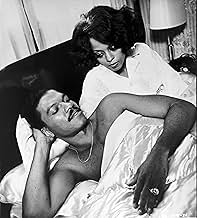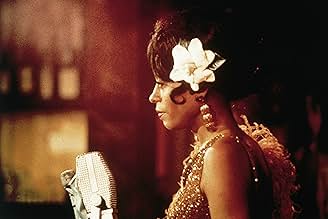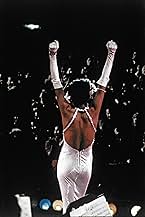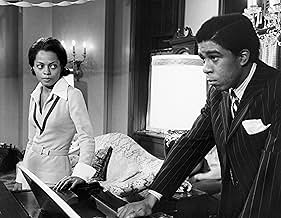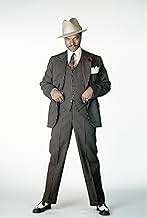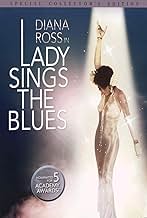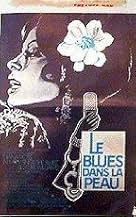La historia de la vida y la turbulenta carrera de la legendaria cantante de jazz Billie Holiday.La historia de la vida y la turbulenta carrera de la legendaria cantante de jazz Billie Holiday.La historia de la vida y la turbulenta carrera de la legendaria cantante de jazz Billie Holiday.
- Dirección
- Guionistas
- Elenco
- Nominado a 5 premios Óscar
- 5 premios ganados y 8 nominaciones en total
- Reg Hanley
- (as James Callahan)
- The Singer
- (as Michele Aller)
Opiniones destacadas
Bearing no physical and little vocal resemblance to Holiday, Ross somehow gets under her true-life character's skin much like Joaquin Phoenix does in "Walk the Line" or Jamie Foxx in "Ray". Thirty-three years have elapsed since I first saw this movie, and it is with a certain amount of regret that I report that Ross as an actress has not been anywhere near this good since then. Granted she only has three features under her belt, 1975's "Mahogany" reflected an ego run amok, and she was disturbingly miscast in 1978's "The Wiz". From the opening scene where she is suffering through heroin withdrawal in raw, harrowing detail to her sultrier nightclub performances, she manages to be incendiary by her sheer will. She is even convincing in the early scenes where she is barely a teenager. Her vocal performances really don't evoke Holiday's earthier style, though to Ross's credit, her vivid renditions of standards such as "Mean to Me", "Fine and Mellow" and "Gimme a Pigfoot (and a Bottle of Beer)" don't sound like Supremes redux either.
This achievement is all the more impressive since director Sidney J. Furie, a journeyman filmmaker at best, has surrounded Ross with an unwieldy rags-to-riches biopic that should have been edited down from its 144-minute running time. The screenplay - credited to Chris Clark, Suzanne De Passe and Terence McCloy (none of whom wrote a movie script before or since) based in part on Holiday's autobiography - plays fast and loose with the facts and piles on the clichés in true Oscar-baiting fashion. The drug-related scenes are powerful, though they eventually start to feel like condescending plot devices to make the viewer sympathize with Holiday for the persecution she experienced at the hands of abusive men and a bigoted society. Moreover, as Furie discloses on the accompanying audio commentary, the dialogue for several scenes is improvised by the actors, for example, the unnecessarily lengthy Club Manhattan sequence, where the lack of discipline becomes wearing.
Contrary to the fact that Holiday's true life story has been well documented and interest in her legacy increased, the filmmakers altered events and people in order to maintain interest from what they thought were mainstream audiences at the time. Consequently, the character of Louis McKay, Holiday's love interest and eventual husband, played with toothsome charm by Billy Dee Williams, synthesizes a lot of men who came into her life and helped shape her career. The dramatized results leave out key figures of the jazz world like saxophonist Lester Young, trombonist Jimmy Monroe to whom Holiday was married, and record producer John Hammond, as well as Benny Goodman, Count Basie, Artie Shaw and Teddy Wilson--all important colleagues and mentors during the period covered in the film. Instead, we are given Holiday's story as filtered through Ross's own story, an observation confirmed by Ross herself on the accompanying 2005 making-of featurette.
When the music is true to the period, it's quite wonderful, but composer Michel Legrand composed some gauzy, anachronistic interludes that sound like symphonic outtakes from his work on "Brian's Song". The costumes also have a Vegas revue feel, no surprise since designer Bob Mackie's flamboyant, early 1970's style is on full display here. For such an overlong movie, the ending feels quite truncated as newspaper clips are used to telegraph her eventual fate as Ross triumphantly sings her signature song, "God Bless the Child", in Carnegie Hall. Credit Motown mogul and Ross's Svengali, Berry Gordy, for having the fortitude, foresight and tenacity to oversee the project, and the DVD hammers that point in not only the overemphatic, only partially insightful commentary by Furie, Gordy and artists' manager Shelly Berger but also the making-of featurette which features Ross looking strangely youthful and Williams at least looking his age. There are several deleted scenes included in the DVD with no additional commentary from Furie, none refurbished and all understandably excised from the final cut.
Her performance is the highlight of the movie, which unfortunately felt like it ran way too long, and I found myself constantly checking the run time. It wasn't bad as a musical. As I had read previously, Ms. Ross didn't seek to imitate Billie Holiday's style, and instead created a distinct and appropriate - yet similar - jazz style of her own just for the movie (check out "Good Morning Heartache"), and I, being a fan, didn't mind the song interludes.
What dragged the movie was the constant focus on Holiday's drug addiction (to showcase more of Ms. Ross's acting?). It felt like there was scene after scene of her being drug-addled, whining, and screaming, which began to abrade after a while. It's too bad, since with better direction and screenplay, coupled with Ms. Ross's capable acting and singing, this could've been one of the truly great musical biopics.
But anyone who hasn't seen Diana Ross' performance in Lady is in for a treat. To think that she went through so many transitions within the film: from youngster, to a drug addict, to a grand singer...it's a truly great performance.
¿Sabías que…?
- TriviaAccording to Diana Ross, Richard Pryor instructed her on how to behave during the scenes of drug use.
- ErroresSome of the African-American male characters and extras sport modern (1972) hair styles with Afros or sideburns which were not in style in the 1930s.
- Citas
Billie Holiday: [after Louis discovers that Billie shoots up] Sure I've taken a few shots, but only when I needed it,
[Louis sighs]
Billie Holiday: but i'm not hooked, Louis. I'm not.
Louis McKay: Only when you needed it. What do you think hooked is? All I had to do is listen to your voice on the telephone and I knew. Who the hell do you think you're talking to? One of those ofay cats you be running around with? I've been on those streets all of my life. I know what that shit is!
Billie Holiday: It's good, ain't it?
[Louis then gets up and takes her suitcase and starts packing her stuff]
Billie Holiday: Wait, Wait, Baby! Oh, no.
Louis McKay: We're going home. Now!
Billie Holiday: [Stopping him] Wait, hey, baby, wait. See, you don't understand. Now, you don't know how it is when people are looking down at you and laughing at you and think that I'm a loser. And if I go home now, I'll think that I'm one, too. I gotta prove it to them. I gotta prove it to myself.
Louis McKay: What're you proving with that needle? That you're not woman enough to make it without a crutch? A magic way out when the going gets a little too rough? I want you to make it, too, baby. But not this way. Not this way.
- ConexionesFeatured in Lady Sings the Blues (Featurette) (1972)
- Bandas sonorasTain't Nobody's Business
Written by Porter Grainger and Everett Robbins
Sung by Blinky (as Blinky Williams)
Selecciones populares
- How long is Lady Sings the Blues?Con tecnología de Alexa
Detalles
- Fecha de lanzamiento
- País de origen
- Idioma
- También se conoce como
- Lady Sings the Blues
- Locaciones de filmación
- Productoras
- Ver más créditos de la compañía en IMDbPro
Taquilla
- Total en EE. UU. y Canadá
- USD 6,028,486
Contribuir a esta página



